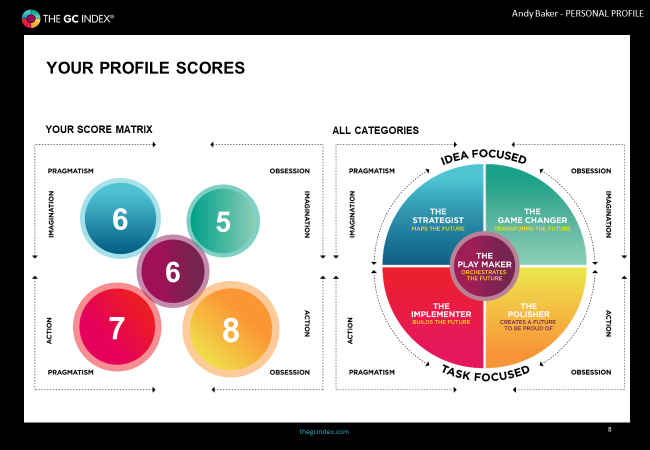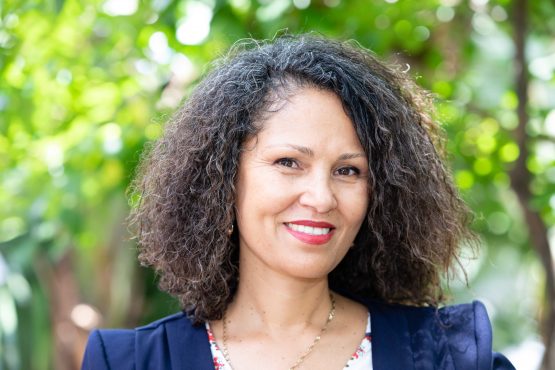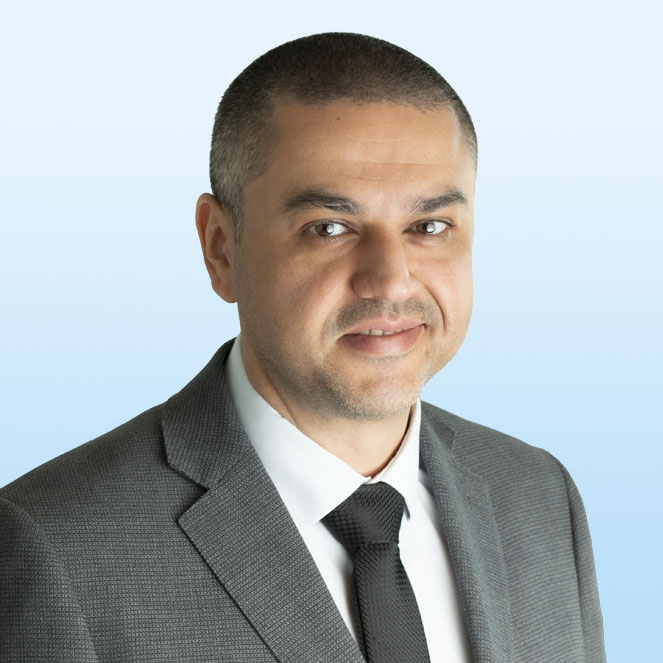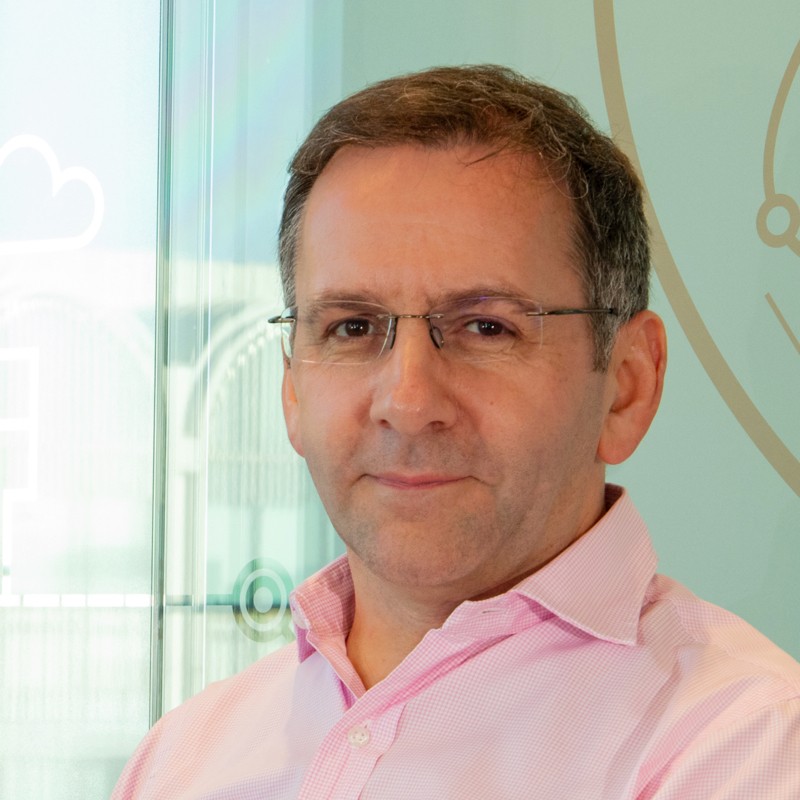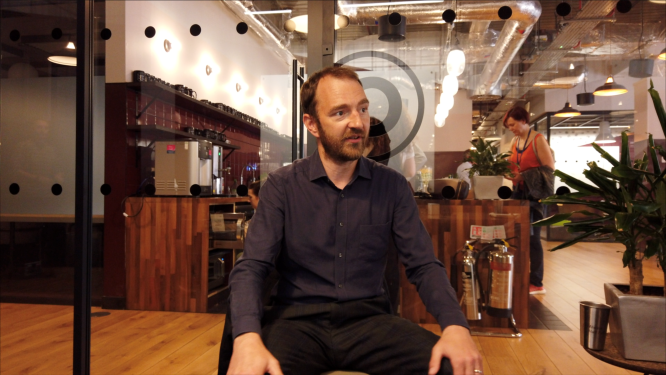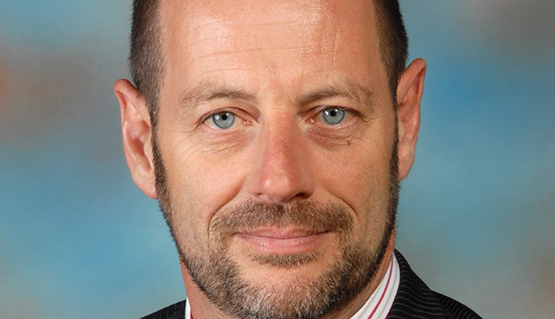
Former Head Teacher
Poole Grammar School
Polisher/ImplementerIn our latest ‘The GC Index People Leader Series’ Helen Rivero, CEO at GC Partner Rivero Consulting Ltd and Co-Founder of The Young People Index, talks to Andy Baker about his career, what it means being a Polisher Implementer and how that has underpinned his success to date.
You have had a successful career, what does your GC Index profile tell us about what underpins your success?
When I and my team did the GC Index as a group, we were all of course very interested in how we would come out. I had done a number of diagnostic questionnaires over the years, and found the GC Index gave a different take on ‘leadership styles’ to ways I have seen it looked at before.
As a team, we all came through more strongly on the ‘task focussed’ than ‘idea focussed’ segments. We had much discussion about this, particularly as one of our members would appear to be strong on strategic thinking. His view is that as his current role involves lots of implementation, this masks his strength in thinking (and acting) strategically.
For me, my profile was relatively even across the segments, though with a higher emphasis on task focussed approaches. I would see this as a good reflection of how I see myself both in and out of work. I’m good at finding workable solutions to problems, and being clear what the relative benefits and costs of different solutions are. I’ve never felt I am strong at ‘blue sky thinking’ – but I am good at responding to stimulus, such as discussion or visual material, and seeing how it could be delivered in a particular context.
I did get a reasonable score for the ‘strategist’ segment, and I do think this reflects my ability to see what the future looks like, and then work backwards from that to where we are now. And the aspect that I think reflects me and the way I do my job is my score for ‘play maker’. As an educator, my job has always been about helping people unlock the skills and capacities they don’t always know they have, and the leader of any complex organisation will spend some of their time spotting talent and seeking to motivate people. It is the aspect of leadership that I consider myself best suited, in terms both of skills but also of my values.
As a team, we all came through more strongly on the ‘task focussed’ than ‘idea focussed’ segments. We had much discussion about this, particularly as one of our members would appear to be strong on strategic thinking. His view is that as his current role involves lots of implementation, this masks his strength in thinking (and acting) strategically.
For me, my profile was relatively even across the segments, though with a higher emphasis on task focussed approaches. I would see this as a good reflection of how I see myself both in and out of work. I’m good at finding workable solutions to problems, and being clear what the relative benefits and costs of different solutions are. I’ve never felt I am strong at ‘blue sky thinking’ – but I am good at responding to stimulus, such as discussion or visual material, and seeing how it could be delivered in a particular context.
I did get a reasonable score for the ‘strategist’ segment, and I do think this reflects my ability to see what the future looks like, and then work backwards from that to where we are now. And the aspect that I think reflects me and the way I do my job is my score for ‘play maker’. As an educator, my job has always been about helping people unlock the skills and capacities they don’t always know they have, and the leader of any complex organisation will spend some of their time spotting talent and seeking to motivate people. It is the aspect of leadership that I consider myself best suited, in terms both of skills but also of my values.
What skills have you had to develop along the way to make the most of your proclivities?
As someone who never had a deliberate career plan or strategy, the skills I have developed have been dependent on the role I have had at a particular time. As a Deputy Head, I made a policy of taking on new challenges as often as I could so I could find out more about my strengths and weaknesses in a practical context. The best example would be taking on the school timetable – a major undertaking which requires a combination of spatial and logical thinking, good memory, and good inter-personal skills in making sure that as far as possible people knew what to expect! I found that I was a very effective timetabler (according to others, not me) because I seem able to hold and access a lot of information simultaneously.
As Head Teacher, the ability to move from one task to another, often with quite different requirements, is an essential skill. I have found that my memory really helps here, along with a calmness under pressure, so that I do not reduce people’s confidence in me by showing panic! I feel it is important not to get drawn into giving people a quick and easy solution just to buy some time or make them happy – and that can take some nerve at times. By building in thinking time you can come back with a more durable solution.
The other aspect I think I have developed is the coaching approach. I used to find it easier to adopt a ‘rescuer’ position, and give a solution. This doesn’t help others grow in their decision making capacity, so I encourage others to bring a solution along with their problem which we can look at together. To me, this is an essential strategy for a teacher, so as a Head Teacher I think it means I’m modelling effective practice with colleagues, as well as managing my own workload.
What I increasingly feel is that these skills are an important part of my development as a leader. What is in many ways more important is the ‘why’ – the moral purpose and values that underpin leadership. It is the backdrop for what you do, and how you do it. Working within an educational context puts a heavy emphasis on remaining visible as a learner as well as a school leader.
As Head Teacher, the ability to move from one task to another, often with quite different requirements, is an essential skill. I have found that my memory really helps here, along with a calmness under pressure, so that I do not reduce people’s confidence in me by showing panic! I feel it is important not to get drawn into giving people a quick and easy solution just to buy some time or make them happy – and that can take some nerve at times. By building in thinking time you can come back with a more durable solution.
The other aspect I think I have developed is the coaching approach. I used to find it easier to adopt a ‘rescuer’ position, and give a solution. This doesn’t help others grow in their decision making capacity, so I encourage others to bring a solution along with their problem which we can look at together. To me, this is an essential strategy for a teacher, so as a Head Teacher I think it means I’m modelling effective practice with colleagues, as well as managing my own workload.
What I increasingly feel is that these skills are an important part of my development as a leader. What is in many ways more important is the ‘why’ – the moral purpose and values that underpin leadership. It is the backdrop for what you do, and how you do it. Working within an educational context puts a heavy emphasis on remaining visible as a learner as well as a school leader.
When have your felt, in your career, that your role was most ‘in tune’ with your proclivities?
I have mentioned above my role as timetabler, which is a mix of detail and strategic thinking. It is probably the role in which my particular combination of skills has been best used – prior to becoming Head Teacher of course!
I feel that my time as Head Teacher has made the best use of the various skills I have, coupled with my underlying values. I do the job in a fairly ‘hands on’ way, with a close eye on operational aspects as well as being responsible for our forward facing approach. I line manage a range of different staff – subject and senior leaders and some non-teaching specialists, and this helps me keep an overview of what is going on at ground level. If we go by my GC Index profile, I can work in a number of different ways, which I think my colleagues would say does sum me up. My relatively low score for ‘game changer’ may reflect that in my current school there is a premium on stability and consistency. I think I might not be such a good fit in a more turbulent school where there is a premium on trying lots of new initiatives on the basis that ‘nothing we’ve tried before has worked’.
I also think that leadership is, to a large extent, personality driven. I quite like attention, and don’t have a problem presenting to large groups of people. I seem able to explain ideas and structures fairly well, and this would probably align with my strength in the ‘implementer’ segment. In this respect I feel my current role is a good fit.
I feel that my time as Head Teacher has made the best use of the various skills I have, coupled with my underlying values. I do the job in a fairly ‘hands on’ way, with a close eye on operational aspects as well as being responsible for our forward facing approach. I line manage a range of different staff – subject and senior leaders and some non-teaching specialists, and this helps me keep an overview of what is going on at ground level. If we go by my GC Index profile, I can work in a number of different ways, which I think my colleagues would say does sum me up. My relatively low score for ‘game changer’ may reflect that in my current school there is a premium on stability and consistency. I think I might not be such a good fit in a more turbulent school where there is a premium on trying lots of new initiatives on the basis that ‘nothing we’ve tried before has worked’.
I also think that leadership is, to a large extent, personality driven. I quite like attention, and don’t have a problem presenting to large groups of people. I seem able to explain ideas and structures fairly well, and this would probably align with my strength in the ‘implementer’ segment. In this respect I feel my current role is a good fit.
When have you felt, in your career, that your role was least ‘in tune’ with your proclivities?
This is a hard one! I haven’t found myself in roles that I don’t think suit my proclivities very often – I don’t particularly like talking on the ‘phone, so email came along at just about the right time for me, and I have a PA who is happy dealing with that side of things. Other than that, working in a school gives me the blend of reactive and forward thinking stuff to keep me interested. When I have felt a lack of a good fit was when I had one or the other. I was acting Head Teacher in a local school for a while, where I was almost all reactive – dealing with behaviour mostly – and I was totally frustrated at being unable to spend time improving teaching and learning. It wasn’t that I can’t deal with behaviour – it was needing the strategic element, in particular empowering good staff through my ‘playmaker’ preference, that I was missing.
After that, I worked for a local authority in a school improvement role, in particular helping schools that were not functioning well. Though that gave me the opportunity to work strategically, what I didn’t get was the regular contact with teachers and students – and that didn’t suit me either. I lacked the contact with the job as it is done (and received) – which I now realise is an essential source of intelligence for a leader.
After that, I worked for a local authority in a school improvement role, in particular helping schools that were not functioning well. Though that gave me the opportunity to work strategically, what I didn’t get was the regular contact with teachers and students – and that didn’t suit me either. I lacked the contact with the job as it is done (and received) – which I now realise is an essential source of intelligence for a leader.
Who do you like to have around you, people who complement your proclivities and get the best from you?
People in education are recruited primarily because they are ‘experts’ in teaching a subject. As their careers progress, they can specialise in pastoral work or subject leadership – but they remain essentially good teachers. I think it is important that the people around me have a shared commitment to making teaching and learning in the school as effective as possible, and that they are good role models of effective (and continuing) learning. The acid test for me when it comes to selecting people to work in my school is whether they can enthuse me with their subject, and whether they enjoy working with young people.
Hierarchies in teaching are relatively flat, so I hope every employee will be able to make a positive contribution to the direction of the school. In terms of my fellow senior leaders, it is more an attitude that I like to work with, rather than a skill set. I like to be presented with a solution alongside any problem that is identified, and I want people to approach the job with positivity. As someone with a range of strengths I hope I can work with most people, though I do particularly prize ‘blue sky’ thinking as I’m not particularly strong at that – where I work with people with a strong ‘ideas’ focus it brings out a – sometimes hidden – part of my skill set. While I’m good at finding workable solutions to problems, I can lose focus when I get into the fine detail, so having colleagues who have a ‘polisher’ drive complement my skill set.
Hierarchies in teaching are relatively flat, so I hope every employee will be able to make a positive contribution to the direction of the school. In terms of my fellow senior leaders, it is more an attitude that I like to work with, rather than a skill set. I like to be presented with a solution alongside any problem that is identified, and I want people to approach the job with positivity. As someone with a range of strengths I hope I can work with most people, though I do particularly prize ‘blue sky’ thinking as I’m not particularly strong at that – where I work with people with a strong ‘ideas’ focus it brings out a – sometimes hidden – part of my skill set. While I’m good at finding workable solutions to problems, I can lose focus when I get into the fine detail, so having colleagues who have a ‘polisher’ drive complement my skill set.
Interviewed by – The Young People Index

